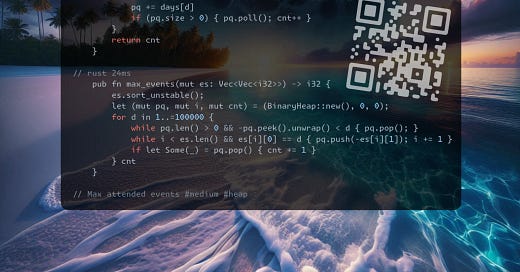# 7.07.2025 [1353. Maximum Number of Events That Can Be Attended]
Max attended events #medium #heap
7.07.2025
1353. Maximum Number of Events That Can Be Attended medium blog post substack youtube
Join me on Telegram
Problem TLDR
Max attended events #medium #heap
Intuition
// 1 2 3 4
// ****
// ****
// ****
// ****
//
// 1 2 3 4
// **********
// *
// *
// ****
// *
//
// 1 2 3 4 5
// 1************
// *********4***
// ************5
// 2***
// ***3
// 3 5 5 3 3
// 2 4 4 2 2 take 1
// 3 3 2 2 take 1 (until it's end)
// 2 2 2 take 1 (until it's end)
// 1 1 take 1 (until it's end, search for end)
// 0 take 1
//
// 1 2 3 4 5 6 7
// *
// ***
// *****
// *******
// *********
// ***********
// *************
The greedy strategy is to never waste a day and prioritize those that ends soon.
iterate over days
close already ended
add all started in that day
take one that ends sooner (maintain a heap to take min)
Approach
iteration over days range is almost as fast as manual day adjusting
Complexity
Time complexity: $$O(nlog(n))$$
Space complexity: $$O(n)$$
Code
// 97ms
fun maxEvents(es: Array<IntArray>): Int {
val days = Array(100002) { ArrayList<Int>() }
for ((s, e) in es) days[s] += e
var cnt = 0; val pq = PriorityQueue<Int>()
for (d in 0..100000) {
while (pq.size > 0 && pq.peek() < d) pq.poll()
pq += days[d]
if (pq.size > 0) { pq.poll(); cnt++ }
}
return cnt
}
// 96ms
fun maxEvents(es: Array<IntArray>): Int {
es.sortWith(compareBy({ it[0] }, { it[1] }))
val pq = PriorityQueue<Int>()
var d = 0; var i = 0; var cnt = 0
for (d in 1..100000) {
while (pq.size > 0 && pq.peek() < d) pq.poll()
while (i < es.size && es[i][0] == d) pq += es[i++][1]
if (pq.size > 0) { pq.poll(); ++cnt }
}
return cnt
}
// 94ms
fun maxEvents(es: Array<IntArray>): Int {
es.sortWith(compareBy({ it[0] }, { it[1] }))
val pq = PriorityQueue<Int>()
var d = 0; var i = 0; var cnt = 0
while (pq.size > 0 || i < es.size) {
if (pq.size < 1) d = es[i][0]
while (i < es.size && es[i][0] == d) pq += es[i++][1]
pq.poll(); ++cnt; ++d
while (pq.size > 0 && pq.peek() < d) pq.poll()
}
return cnt
}
// 24ms
pub fn max_events(mut es: Vec<Vec<i32>>) -> i32 {
es.sort_unstable();
let (mut pq, mut i, mut cnt) = (BinaryHeap::new(), 0, 0);
for d in 1..=100000 {
while pq.len() > 0 && -pq.peek().unwrap() < d { pq.pop(); }
while i < es.len() && es[i][0] == d { pq.push(-es[i][1]); i += 1 }
if let Some(_) = pq.pop() { cnt += 1 }
} cnt
}
// 69ms
int maxEvents(vector<vector<int>>& es) {
sort(begin(es), end(es));
priority_queue<int, vector<int>, greater<int>> pq;
int i = 0, cnt = 0;
for (int d = 1; d <= 100000; ++d) {
while (size(pq) && pq.top() < d) pq.pop();
while (i < size(es) && es[i][0] == d) pq.push(es[i++][1]);
if (size(pq)) { pq.pop(); ++cnt; }
} return cnt;
}



